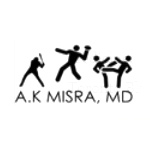Health Tips Brought to You By U.S. HealthWorks Medical Group. Our experienced medical experts provide information here that we hope will broaden your healthcare knowledge.
Today’s topic is a common problem that people of all ages encounter and often seek medical attention for at an Urgent Care center: sports injuries. Please continue reading to learn more from Dr. Anuruddh (A.K.) Misra, a Board Certified Internal Medicine Physician and Sports Medicine Specialist. He serves as Medical Director at U.S. HealthWorks in South San Francisco and is also volunteer Team Physician for the Toronto Blue Jays and the Los Angeles Dodgers.
- How often do you encounter sports injuries?
I see sports injuries on a regular basis. They happen to people of all ages and all skill levels, especially since the number of people participating in physical activity has increased over the last 10 to 20 years. Sports-related injuries and illnesses are also seen at all levels of patient engagement: primary care, urgent care and the emergency department.
- When does a parent/coach need to seek medical attention?
I recommend immediate medical attention in the event of a sports injury. The injured person needs to be evaluated either by a physician or care extender, such as a certified athletic trainer. This is primarily so the injured person can begin managing their injury immediately, with proper direction.
Treatment plans are based on the type and severity of injury, so a prompt evaluation is necessary to help us make medical decisions based on clear, established medical facts. A delay in the initial evaluation is perhaps the biggest disservice to both the injured person and the medical team responsible for returning the individual to their pre-injury state.
- What’s the best method to treat minor injuries – strains and sprains?
I use the acronym “PRICE” to explain and teach the essential elements of minor strain and sprain management:
P – Pain control
R – Rest
I – Ice
C – Compression
E – Elevation
This is a medically reasonable way to get started in advance of attaining a formal medical evaluation.
- Should parents/coaches give young children Ibuprofen on a somewhat regular basis for healing or playing through pain?
No. People without medical expertise should not make medical decisions related to medications. This is a point of considerable angst and significant concern whenever the medical community sees it, especially in youth sports. We do our best to discourage this practice because it can result in adverse effects and outcomes (e.g. bleeding from the stomach). It’s always best for a physician, such as a Sports Medicine MD or an orthopedic specialist, to make decisions about medications, innocuous as even over-the-counter ibuprofen may seem.
- What’s the long-term effect of mistreating sports injuries?
There are several things that can go from bad to worse if treatments are misguided or recommendations get off on an incorrect track to start. While inappropriate bracing techniques for strains and sprains may not seem concerning, unfortunately such practices can lead to poor fracture management. This can cause a deformity that could have been avoided, or in a worst-case scenario, result in corrective surgery. Similarly, poor management of common medical illnesses encountered in sports can also have worse outcomes if not rapidly identified accurately and addressed accordingly.
Dr. Anuruddh (A.K. ) Misra is the Medical Director at US HealthWorks in South San Francisco.








